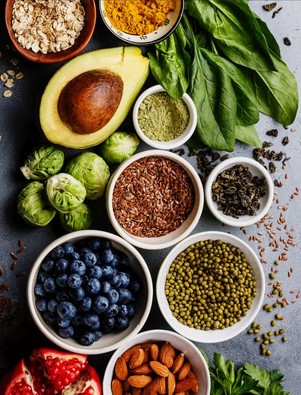Introduction:
In a world inundated with fad diets and conflicting nutritional advice, it can be challenging to discern which foods truly promote health and vitality. However, amidst the confusion, certain foods stand out as nutritional powerhouses, offering a plethora of benefits for both body and mind. In this comprehensive guide, we’ll explore a curated list of healthy foods that not only taste delicious but also nourish your body from the inside out.
- Leafy Greens:
Leafy greens such as spinach, kale, and Swiss chard are nutritional powerhouses packed with vitamins, minerals, and antioxidants. They are low in calories but high in fiber, making them excellent for weight management and digestive health. Additionally, leafy greens are rich in vitamin K, which is essential for bone health, and lutein and zeaxanthin, which promote eye health. - Berries:
Berries such as blueberries, strawberries, raspberries, and blackberries are not only delicious but also incredibly nutritious. They are loaded with antioxidants, particularly anthocyanins, which have been linked to a reduced risk of chronic diseases such as heart disease and cancer. Berries are also rich in fiber and vitamin C, making them an excellent choice for boosting immunity and promoting healthy digestion. - Fatty Fish:
Fatty fish such as salmon, mackerel, and sardines are excellent sources of omega-3 fatty acids, which are essential for brain health and heart health. Omega-3 fatty acids have anti-inflammatory properties and may help reduce the risk of chronic diseases such as heart disease, arthritis, and Alzheimer’s disease. Additionally, fatty fish are rich in protein and vitamin D, making them a nutrient-dense choice for overall health and well-being. - Nuts and Seeds:
Nuts and seeds are nutrient-dense foods that provide a wide range of health benefits. They are rich in healthy fats, protein, fiber, vitamins, and minerals. For example, almonds are a good source of vitamin E and magnesium, while chia seeds are high in omega-3 fatty acids and fiber. Incorporating a variety of nuts and seeds into your diet can help reduce the risk of chronic diseases such as heart disease and diabetes and promote overall health and longevity. - Whole Grains:
Whole grains such as oats, quinoa, brown rice, and barley are an essential part of a healthy diet. Unlike refined grains, which have been stripped of their nutrient-rich bran and germ, whole grains retain their fiber, vitamins, and minerals. They are rich in complex carbohydrates, which provide sustained energy and help regulate blood sugar levels. Whole grains are also a good source of B vitamins, iron, and magnesium, which are essential for energy production and overall health. - Yogurt:
Yogurt is a fermented dairy product that is rich in probiotics, beneficial bacteria that promote gut health. Probiotics have been linked to improved digestion, immune function, and even mood regulation. Additionally, yogurt is an excellent source of calcium, protein, and B vitamins, making it a nutritious and versatile food choice. Opt for plain, unsweetened yogurt to avoid added sugars and artificial ingredients. - Cruciferous Vegetables:
Cruciferous vegetables such as broccoli, cauliflower, Brussels sprouts, and cabbage are powerhouse foods that offer a wide range of health benefits. They are rich in vitamins, minerals, and antioxidants, including vitamin C, vitamin K, and sulforaphane. Cruciferous vegetables have been linked to a reduced risk of cancer, particularly breast, prostate, and colorectal cancer. They are also low in calories but high in fiber, making them an excellent choice for weight management and digestive health. - Lean Proteins:
Lean proteins such as chicken, turkey, tofu, and legumes are essential for building and repairing tissues, maintaining muscle mass, and supporting overall health. They are rich in high-quality protein, which is essential for satiety, muscle growth, and immune function. Additionally, lean proteins are low in saturated fat and cholesterol, making them a heart-healthy choice. Incorporate a variety of lean proteins into your diet to ensure you’re getting all the essential amino acids your body needs.
Conclusion:
Incorporating a variety of nutrient-dense foods into your diet is key to promoting overall health and wellness. By focusing on whole, minimally processed foods such as leafy greens, berries, fatty fish, nuts and seeds, whole grains, yogurt, cruciferous vegetables, and lean proteins, you can nourish your body with the vitamins, minerals, antioxidants, and phytonutrients it needs to thrive. Whether you’re looking to boost your immunity, support your digestive health, or maintain a healthy weight, these healthy foods are sure to leave you feeling energized, vibrant, and ready to take on the day.
